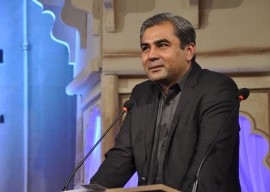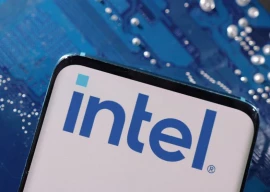
On the third floor of the State Bank of Pakistan headquarters building in Karachi, just as you are about to turn into the corridor that leads to the Governor’s office, there is a gigantic painting on the wall that you simply cannot miss.
In rich, vibrant colours, it depicts the destitute state of the refugees arriving in Pakistan after Partition with little more than the clothes on their back. It seems to serve almost as a reminder to the incumbent of that office that even as he sits as the head of one of the most powerful institutions in the country, his job is to ensure that the financial services sector in the country serves the nation as a whole.
As it turns out, Yaseen Anwar, the man most recently appointed to the Governor’s job, does not think that Pakistan’s banks are serving the needs of the economy.
“Banks are not fulfilling their role as financial intermediaries in the economy,” says Anwar. “In fact, the management teams at the banks are not even serving the long term interests of their shareholders. They need to diversify.”
The ill of which the governor speaks is the fact that the majority of bank lending over the last four years has been to the government, in the form of investments in treasury bills. Rather than funding new and existing businesses to run and expand their enterprises, the banks are financing the government’s gaping budget deficit. While he does not explicitly state it, it seems clear that he feels this is less than an ideal use of capital.
“It is understandable why they do so”, says Anwar, warming to the topic. “After all, if the government has a seemingly insatiable appetite for borrowing and is paying a 12% interest rate with no risk, why would a bank lend to a company at 14% or to a start-up at a higher rate when the risks are disproportionately higher?”
Another root of the problem that the governor identifies is the fact that the banks have no competition when it comes to lending.
“If companies could go out to the capital markets and issue corporate bonds or commercial paper at a lower rate, that would create pressure on the banks,” says Anwar, adding that it would eventually lead to lower interest rates across the economy and a more competitive financial services sector.
The governor is working with his counterpart at the Securities and Exchanges Commission of Pakistan – the country’s top capital markets regulator – to develop a deeper, more liquid fixed income market to give the banks a run for their money.
It is somewhat remarkable to hear such frank criticism from a man who has been a banker for nearly his entire career. Soon after graduating from the prestigious Wharton School at the University of Pennsylvania – the Mecca for finance nerds – with a degree in economics and political science in 1972, he joined Chase Manhattan Bank (a predecessor institution of JPMorgan Chase) in New York.
After a two-year stint he joined the Bank of America, where he served in Paris, London, Cairo and New York, leaving the firm to join Merrill Lynch, then one of the largest investment banks in the United States. “It felt kind of odd to have two previous employers merging,” says Anwar, referring to the shotgun marriage in 2008 between the venerable Wall Street brand and the more humdrum retail outfit.
Anwar was familiar with the State Bank Governor’s office long before he ever even joined the institution. As a young banker, he once sat across the table from AGN Kazi – the governor from 1978 to 1986 – when he had been part of the Bank of America team advising the government of Pakistan on some of its international transactions.
As he takes up the job in a permanent capacity (having twice served as acting governor), he ponders the state of the highly concentrated banking sector in Pakistan – where nearly three-quarters of the deposits are held by just five institutions.
Yet even while acknowledging that Pakistan does have a “too big to fail” syndrome, Anwar does not view that concentration of deposits as a problem.
“There are three reasons why a bank fails, and bad loans aren’t one of them. It is liquidity, liquidity, and liquidity,” he says. “Pakistan’s banks have a capital adequacy ratio (a measure of a bank’s financial health) of around 14%, compared the global average of around 8-9%.”
He identifies the size of the five large banks – particularly their branch networks – as an asset that can be leveraged by both the banks themselves as well as the non-banking sector. In other words, he believes that the banks themselves will serve as incubators for their biggest rivals: capital markets firms that create an alternative to bank deposits and lending.
“Look at who Arif Habib Investments decided to merge with: MCB Asset Management,” said Anwar, pointing to the 2010 merger between those two asset management companies as an example of capital markets firms leveraging a large branch network and a bank diversifying its product portfolio.
It becomes clear during the course of the interview that the governor is very concerned with the next stage of growth in the financial services sector. “Now that I have been given the job, I can start making long term decisions.”
One of the initiatives he is most keen on is helping the growth of branchless banking. He pointed proudly to an assessment by CGAP (Consultative Group to Assist the Poor), a division of the World Bank, that is holding up the SBP’s regulatory structure for branchless banking as a global model.
Anwar is also a strong advocate of pushing the banks to upgrade their technology infrastructure, an effort he feels will simultaneously increase access “for the unbanked” as well as lowering overall transaction costs. The central bank is pushing, for instance, to roll out the Real Time Gross Settlement (RTGS) system to cover all payments made through banks. The system would allow instantaneous payments between companies while still allowing banks to manage their risks.
Another initiative being pursued by the State Bank is the Mortgage Refinance Corporation, which Anwar believes will not only revolutionise the secondary market for debt securities, but also dramatically expand the lending capacity of banking sector, in turn serving to boost economic growth.
It is not yet clear how successful the new governor will be in implementing his ideas. His appointment did not receive positive coverage, with much speculation about the possible political machinations behind his predecessor’s departure and his own appointment.
Anwar dismissed much of the rumour-mongering as being devoid of factual basis, choosing to describe himself as being straightforward, and agreeing with my own description of him as ‘diplomatic’.
One wonders if he picked up that combination of personality traits from his upbringing. Anwar is the son of a legendary naval officer, Commodore SM Anwar, who led the Pakistani fleet in “Operation Somnath” during the 1965 war, when Pakistani ships attacked the Indian naval base in Dwarka.
He spent a significant portion of his childhood in Georgetown, an upscale neighbourhood in Washington DC that is home to ambassadors and senators alike. (His father was serving as naval attaché at the Pakistani embassy at the time.)
One gets the impression that, even though he seems mild-mannered, the governor is not intimidated by high office or the powerful people that sit in those offices. That is likely to be useful, since a big part of his new job will be to speak uncomfortable truths to those very people.
Published in The Express Tribune, November 2nd, 2011.
Correction: An earlier version of this article misquoted the SBP governor saying that the government is paying 12.5% interest on borrowings, whereas the correct rate is 12%. The correction has been made.
COMMENTS (3)
Comments are moderated and generally will be posted if they are on-topic and not abusive.
For more information, please see our Comments FAQ
































1714024018-0/ModiLara-(1)1714024018-0-270x192.webp)









Good article. It is interesting to see that Governor seems to be pushing for increased private sector lending and further development of capital markets. But one wonders in the current state of high risk and already shrinking capital market, how much of that would be achievable since the cost of borrowing would be significantly higher for getting funds through non-banking channels. Secondly, we don't see any mention of how Governor plans to reign in the issue of inflation, which I believe is a key economic concern at this point.
This is the problem. A banker but not a CENTRAL banker.